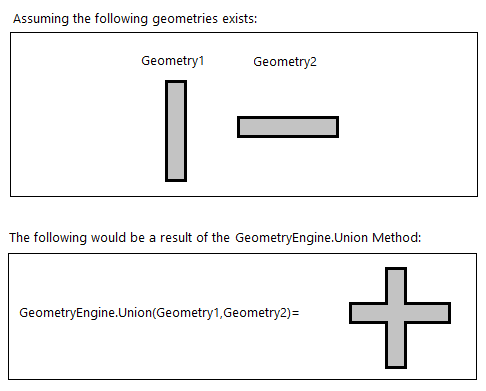Method Union
Union(Geometry, Geometry)
The union operation constructs the set-theoretic union of the geometries in the input array.
Declaration
public static Geometry Union(this Geometry geometry1, Geometry geometry2)Parameters
| Type | Name | Description |
|---|---|---|
| Geometry | geometry1 | The first geometry to union with. |
| Geometry | geometry2 | The second geometry to union with. |
Returns
| Type | Description |
|---|---|
| Geometry | The union of the two geometries. |
Remarks
GeometryEngine.Union returns all parts of the two input geometries combined into a single geometry. This means that the
order of the input parameters is irrelevant. In a theoretical variable format
you can think of the GeometryEngine.Union equation like:
A (Union) B = C
B (Union) A = C
The following is a visual illustration of two polygon geometries and how the output result would be from the GeometryEngine.Union operation:

If the two geometries have different dimensionality, returns a copy of the geometry with the higher dimensionality. E.g. if given a polygon and a point, returns the polygon.
Supports true curves.
Applies to
Platforms and versions
| Target | Versions |
|---|---|
| .NET Standard 2.0 | 100.3 - 200.4 |
| .NET | 100.13 - 200.4 |
| .NET Windows | 100.13 - 200.4 |
| .NET Android | 200.0 - 200.4 |
| .NET iOS | 200.0 - 200.4 |
| .NET Framework | 100.0 - 200.4 |
| Xamarin.Android | 100.0 - 100.15 |
| Xamarin.iOS | 100.0 - 100.15 |
| UWP | 100.0 - 200.4 |
Relevant samples
Union(IEnumerable<Geometry>)
Calculates the union of a collection of geometries
Declaration
public static Geometry Union(this IEnumerable<Geometry> geometries)Parameters
| Type | Name | Description |
|---|---|---|
| System.Collections.Generic.IEnumerable<Geometry> | geometries | A collection of geometries. There must be at least one geometry in the collection. |
Returns
| Type | Description |
|---|---|
| Geometry | The union of all the geometries in the given collection. |
Remarks
The union combines those parts of the input geometries which overlap into a single geometry.
If the collection contains geometries of differing dimensionality, the geometry with the higher dimensionality is returned. For example, a polygon is returned if the given a collection contains polygons, polylines, and points.
Supports true curves.
Applies to
Platforms and versions
| Target | Versions |
|---|---|
| .NET Standard 2.0 | 100.3 - 200.4 |
| .NET | 100.13 - 200.4 |
| .NET Windows | 100.13 - 200.4 |
| .NET Android | 200.2 - 200.4 |
| .NET iOS | 200.0 - 200.4 |
| .NET Framework | 100.1 - 200.4 |
| Xamarin.Android | 100.1 - 100.14 |
| Xamarin.iOS | 100.1 - 100.15 |
| UWP | 100.1 - 200.3 |